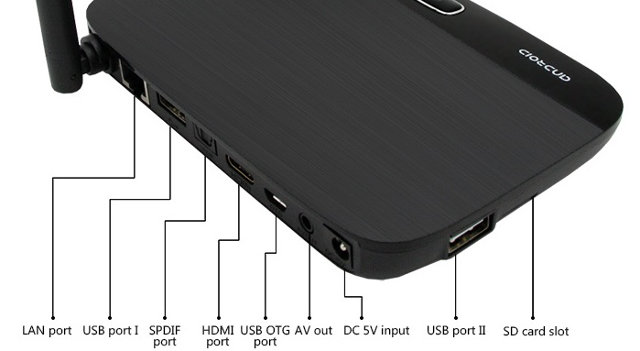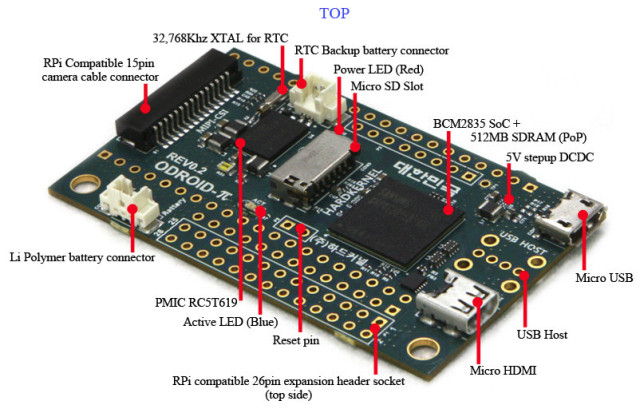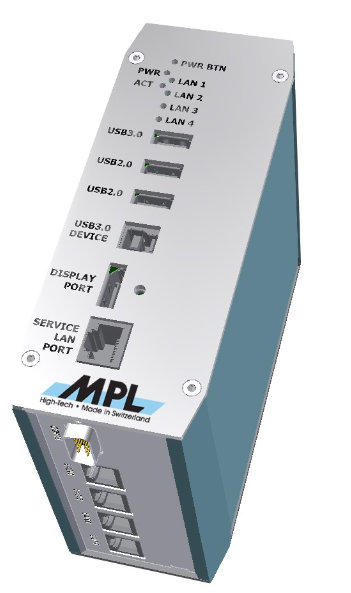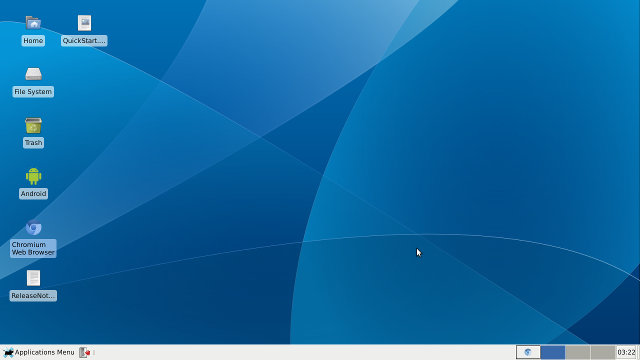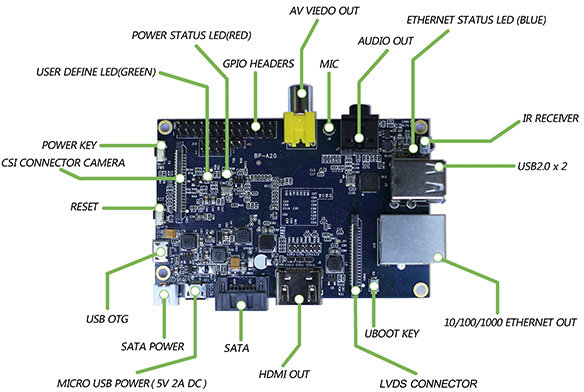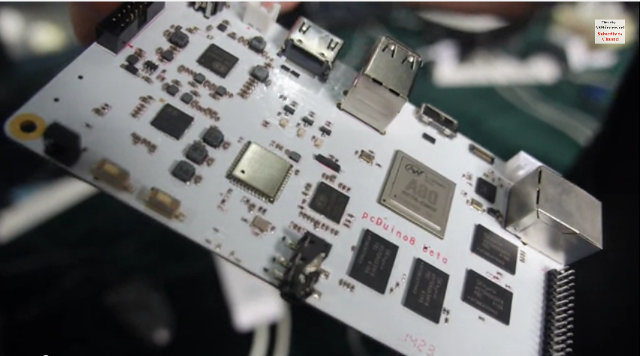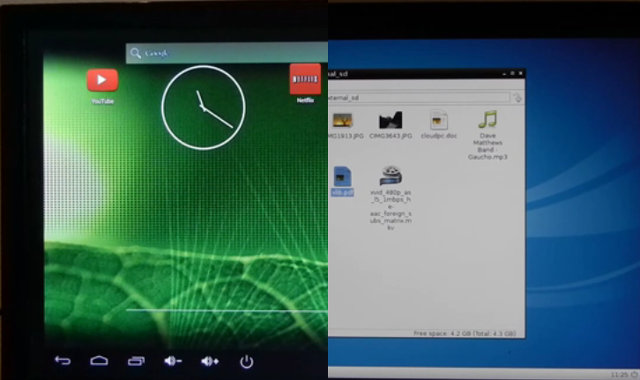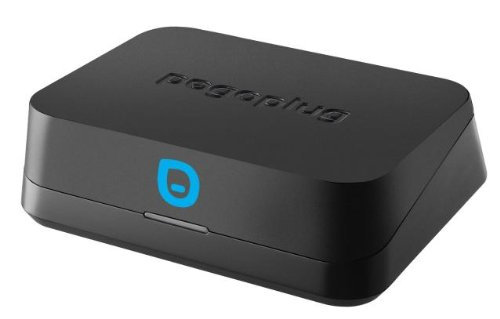Last months, I tested VolksPC’s Android/Debian unified distribution on MK808 mini PC, which runs both operating systems at the same time, and allows you to switch instantaneously and seamlessly between the two. I was impressed by the performance and stability of the system, although there were still a few software bugs, as well as issues related to MK808 hardware (Wi-Fi disconnection), and possibly its 5V/1A power supply (system reboot when inserting SD card reader or flash drive). The company has now started a crowd-funding campaign on Indiegogo to manufacture dual core Android TV box with their unified distribution. VolksPC specifications: SoC – Rockchip RK3066 dual core ARM Cortex-A9 processor @ 1.4Ghz with Mali-400MP4 GPU System Memory – 1GB DDR3 Storage – 8 GB NAND Flash (for Android), 8GB MicroSD card (Debian Wheezy) Video Output – HDMI 1.3, AV jack Audio Output, HDMI, AV jack, and optical S/PDIF Connectivity – 10/100M […]
Hardkernel Unveils $30 Raspberry Pi Compatible Module with RTC, ADC, and LiPo Battery Support
Hardkernel is better know for its ODROID boards powered by Samsung Exynos SoC. So I was surprised to discover ODROID-W, “a miniature computing module which is fully compatible with all software available for the Raspberry-Pi”. Software compatible, really? Yes, because they used the same Broadcom BCM2835 SoC found in the Raspberry Pi, packaged it in a smaller form factor, while keeping HDMI, USB, and CSI interface, and expansion headers, and all that for $30, plus just $9 for shipping. Let’s go through ODROID-W specifications first: SoC – Broadcom BCM2835 ARM1176JZ-F processor @ 700 Mhz with VideoCore IV GPU System Memory – 512MB LPDDR2 (Samsung K4P4G324EB PoP) Storage – microSD slot + eMMC socket (bottom of the board) Video Output – micro HDMI (with NXP IP4791CZ12 protection IC) USB – micro USB connector, and USB host (not soldered) Expansion Headers: R-Pi compatible 26-pin expansion header (through holes) R-Pi compatible 15-pin CSI […]
MPL CEC10 Compact Embedded Computers Feature Bay Trail SoCs, 5 Gigabit Ports, Rugged Enclosures
MPL, a company specializing in industrial PCs based in Switzerland, has recently announced their CEC10 series “Compact Embedded Computer” featuring Intel Bay Trail-I E3800 processors, with 5 Gigabit Ethernet ports using RJ45, M12, or SFP connectors, and supporting industrial and extended temperature ranges, and as well as various rugged housings. Specifications for MPL CEC10: SoC – Intel Atom E3800 series single, dual, or quad processor @ up to 1.91GHz with Intel HD graphics. System Memory – up to 4GB DDR3L ECC-RAM Storage: mSATA interface Optional 2.5-inch SATA HDD/SSD Optional eMMC flash (soldered) Video Output- DisplayPort, optional eDP / VGA Connectivity – 5x gigabit Ethernet ports. RJ45 connectors by default, but the system also supports M12 connectors or SFP cages. USB – 1x USB 3.0 host port, 1x USB 3.0 device port, 2x USB 2.0 ports Serial – 1x RS-232 port, optional RS-232/422/485 or extra RS-232 port Expansion Slots: Mini-PCIe slot […]
Testing VolksPC’s MicroXwin Android & Debian Distribution in MK808 mini PC
Earlier this week, I wrote about VolksPC mini PC running Debian and Android simultaneously, and the developers decided to send me a unit for testing. The hardware I received is the popular MK808 mini PC based on Rockchip RK3066 with 1Gb RAM, and 8 GB RAM, but loaded with MicroXwin unified distribution. MicroXwin is an implementation of Windows X that’s not using a client/server protocol, for instead communicates directly with the drivers for better performance, especially on low-end hardware. I connected MK808 to my HDMI TV, added a USB hub to connect a USB keyboard as well as Mele Air Mouse, and powered up the device. The boot to Debian takes about 30 seconds, and 50 seconds for Android. As you boot it will enter in Debian with XFCE desktop environment, and you’ll notice two files, namely the Quick Start Guide and Release Notes that explain how to get started […]
Lemaker.org is Giving Away Banana Pi Development Boards to Developers and Fans
Banana Pi is a development board powered by AllWinner A20 dual core SoC with 1GB RAM, and with expansion headers and a form factor very similar to the Raspberry Pi. It can run Debian, Lubuntu, Android 4.2, Arch Linux ARM, Scratch OS, and OpenSuse, but Lemarker.org community would like more educational materials such as open source software or hardware projects, tutorials, etc.., so they’ve launched a program to give away boards to developers and people who can help writing and maintaining documentation. There are three categories of projects: STEAM – “Science, Technology, Engineering, Art & Mathematics” educational, open source projects running on the the Banana Pi Hardware or Software Project – Open source projects based on Banana Pi which could be helpful to the community, including open source hardware peripherals projects; Banana Pi Fans – You don’t need to be as technical as for the two others categories, but you […]
PcDuino8 Octa-core Development Board Revealed (Video)
Two AllWinner A80 powered development boards are currently expected. We’ve already seen some pictures of the Cubieboard8, and today we can gt more details about PcDuino8 development board thanks to Charbax who visited Linksprite, and interviewed the company. Here are PcDuino8 (Beta) specifications based on the interview and pictures: SoC – AllWinner A80 octa core big.LITTLE processor with 4 ARM Cortex A15 cores, 4 Cortex A7 cores, and Imagination PowerVR G6200 GPU System Memory – 1GB Storage – 4GB flash + micro SD Card slot Video Output – HDMI Audio Output – HDMI, stereo audio jack Connectivity – Gigabit Ethernet, Wi-Fi 802.11 b/g/n + Bluetooth 4.0 (AP6330 module) USB – 2x USB 2.0 host ports, 1x Micro-B USB 3.0 port Debugging – 14-pin header for JTAG Expansion Header – 32-pin header Misc – IR receiver Power – Round DC power jack (5V?) The hardware specs are a bit lower compared […]
VolksPC mini PC runs Debian and Android Simultaneously Thanks to MicroXwin Framework
It’s been possible to run Linux or Android on ARM based board and producs for a while, with some firmware providing dual boot support, or even simultaneous use running a chroot with a VNC server and client combination. Some developers have come up MicroXwin, a X-windows implementation using a custom Xlib library that communicate directly with the graphics drivers, and not using a client/server implement. This provides much faster performance compare to X11, as shown on Raspberry Pi and Cubieboard2 development boards, and it has given them the ability to run Debian LXDE and Android Jelly Bean simultaneously on their upcoming VolksPC, a mini PC based on Rockchip RK3066 with 16GB flash. The first VolksPC will have the following specifications: SoC – Rockchip RK3066 dual core ARM Cortex A9 CPU @ 1.4Ghz with Mali-400MP4 GPU System Memory – 1 GB DDR3 Storage – 16 GB NAND flash + SD/MMC/MS card […]
The World’s Cheapest Linux Computer? Pogoplug Mobile Now Sells for $7
Somebody asked “Anyone knows a computer cheaper than a Raspberry Pi with a network interface?” on Google+ mini PCs community. Some OpenWRT routers such as TPLink WR703N selling for about $20, or the VoCore Wi-Fi module selling for about the same price (Wi-Fi only) were parts of the answers, and I also mentioned some HDMI TV dongles that now sell for around $35, which is still a little cheaper than the Raspberry Pi model B when one considers shipping. But I found the answer by dhead666 particularly interesting: Pogoplug Mobile goes for 7$ on Amazon and that includes psu and network cable. It run Linux great (I’m using Arch) but you will want to have a ttl-usb cable and soldering iron available in case you manage to mess u-boot (go to the doozan’s forums for more info about the u-boot). Let’s have a look. Pogoplug Mobile is not a new […]


